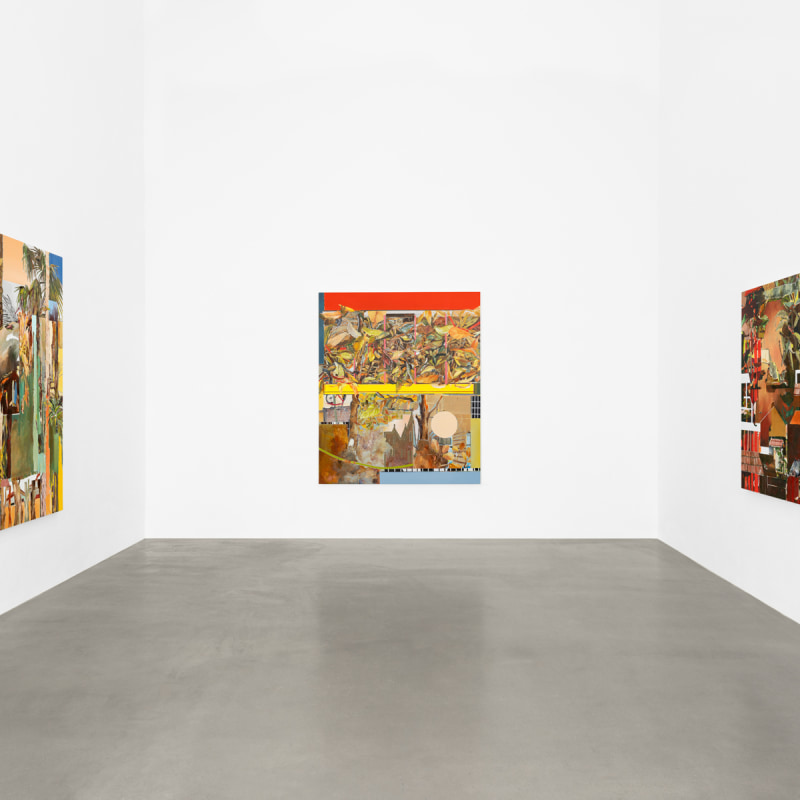I believe that painting can recover a time for gazing that has been lost in the chaos of images that bombard our cities (…) The slowness, the introspection that painting entails pleases me, asking me to translate reality according to this lost perspective.
– Lucia Laguna quoted in Economia da Pintura by Paulo Herkenhoff, 2008
This November, Brazilian-born artist Lucia Laguna (b. 1941) will present a new group of paintings at the Davies Street gallery – significantly marking her first solo exhibition in the UK.
Laguna began her career after studying art at the Escola de Artes Visuais do Parque Lage, Rio de Janeiro, in the early 1990s, having previously had a career teaching Portuguese and literature at public schools. Over the course of the past two decades, she has become one of South America’s most celebrated artists, with a painting practice that is deeply rooted in the close observation of her surroundings – made from her home and studio in Rio de Janeiro’s sprawling North Zone – that celebrate the lush ecosystems found in her home country of Brazil.
Spanning painting and collage, Laguna typically divides her works into three distinct groupings: Jardim (Garden), Estúdio (Studio) and Paisagem (Landscape). In this exhibition, Laguna presents a number of new canvases in acrylic that extend her ongoing Paisagem series, which explore the richly layered entanglement of the natural and urban worlds primarily viewed from her studio window. Beyond her own personal reflections, Laguna’s practice is distinctly process driven and contingent upon dialogue. The paintings begin with a proposition put forth by the artist to her studio assistants, asking them to reproduce images or imagetic ideas drawn from the inventory of her personal universe – be it from art history or the world around her. She then proceeds with her own emphases and interventions: deconstructing, erasing and rebuilding. Through this interplay, the landscape emerges as a generative visual conversation or palimpsest – mirroring the continually evolving nature of her suburban subject matter.
Developed in response to this environment, the works combine a shifting vocabulary of spatial articulation, colour, density and texture, to conjure rapturous, multichromatic scenographies. Throughout, flora and fauna are rendered in freely applied, gestural brushstrokes that spill exuberantly across the paintings’ surface in swathes of saturated colour and sinuous pattern, animating the landscape with dynamic abundance. Set in contrast, the architectural elements are flattened as minimal geometric forms and planes of vibrant colour. Spared almost entirely of extraneous detail, the modular structures speak to both the city’s densely packed makeshift favela zones and elemental modernist architecture.
Simultaneously abstract and concrete, the landscapes appear unmoored from rudimentary logic, time and space, instead evoking a topography of memory and experience. The works on view in this exhibition range from panoramic hillside vistas, to concentrated compositions that fuse the manmade and the organic. In Paisagem nº 128, elongated and cropped fragments of palm leaves, tree trunks and roots are arranged in a multiplane formation as though viewed inversely from a window. Elsewhere, scenes oscillate between interior and exterior, with buildings described in grids and panels, that both contain and are equivalently contained by the natural environment.
* The title of the exhibition is a translated verse from Brazilian poet Cecília Meireles’ Reinvenção: “A vida só é possível reinventada”, first published in her book Vaga Música, 1942.
In 1998, Laguna presented her first solo exhibition at Cândido Mendes Cultural Centre, Rio de Janeiro. Subsequent solo shows followed in the late 1990s and 2000s, and in 2012 she participated in the 30th Bienal de São Paulo, marking a decisive turning point in her career. Laguna has since had major solo exhibitions, including Se hace camino al andar, Carpintaria, Rio de Janeiro (2021); Lucia Laguna, Fortes D'Aloia & Gabriel, São Paulo (2020); Vizinhança, MASP – Museu de Arte de São Paulo, São Paulo (2018); Enquanto bebo a água, a água me bebe, MAR - Museu de Arte do Rio, Rio de Janeiro (2016). Her work is held in numerous public collections including those of MASP, MAM-SP, MAM-RJ, MAR. In 2006 she was awarded the Marcantônio Vilaça Prize from CNI SESI.
